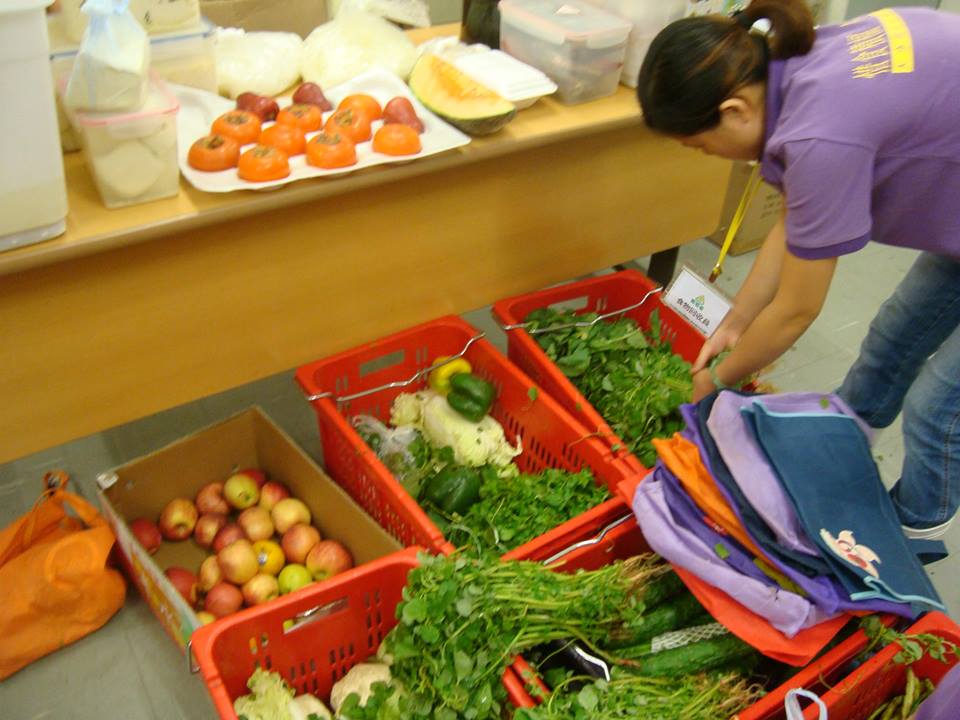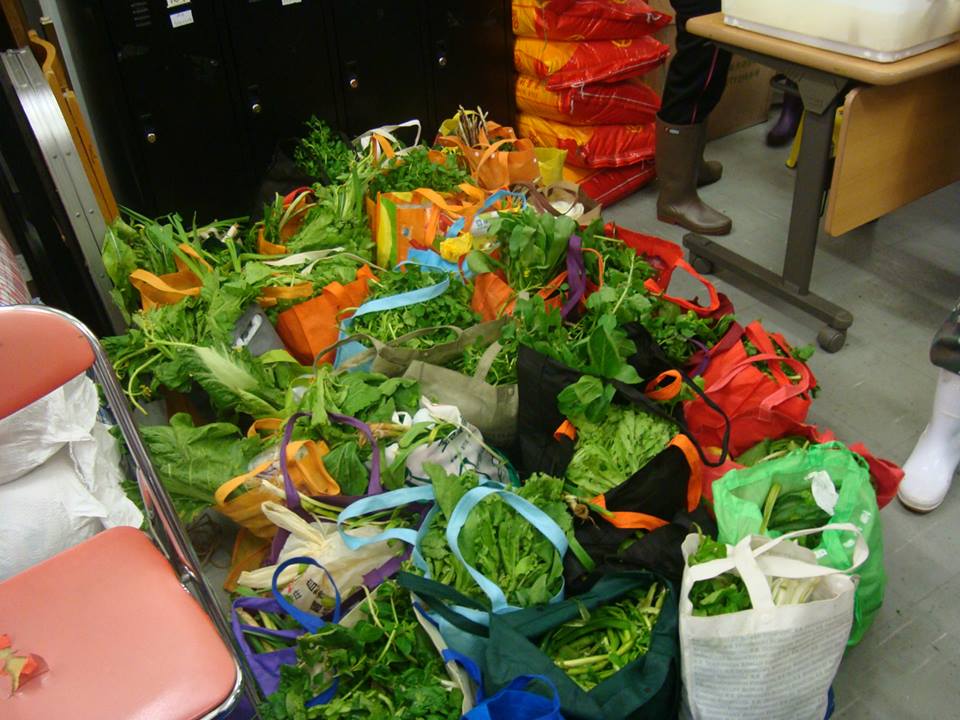By Megan Leung, Doris Yu and Achlys Xu
Shortly after 6 p.m., when many people are rushing home from work, it is the golden hour for grocery shopping in Hong Kong’s wet markets. That is when 50-year-old Leung Chun-wah, who works as a construction site cleaner, does her daily food shopping.
Most days after work in North Point, Leung makes a 42-minute MTR journey to Tsuen Wan, then walks 10 to 15 minutes to Yeung Uk market to pick up ingredients for dinner. The prices are cheaper here than in her local market, and just before the stalls close for the evening is the best time for bargains.

From Yeung Uk, Leung takes a half hour bus journey to get home, which is in Tsing Yi. It is exhausting but worth it for the long-term cost savings.
Leung also knows which methods to use to cut cooking-related costs. “When I cook, I use all the compartments in the rice cooker, steam a tail of fish and make a meat cake at the same time so that I can save some electricity.”
To stay within their budget, Leung and her family of three rarely eat out. “Meals are very expensive around where I work, so if there are leftovers from the night before, I will bring and reheat them for lunch,” she continues.
Reducing food expenses is a common strategy for lower-income households. With costs such as rent, electricity and water fees increasing drastically, plus tuition-related fees for children, households living on low earnings and limited allowances have no choice but to adjust their spending on variable costs such as food.
The concept of hunger is often linked to starvation. In Hong Kong hunger is regularly overlooked because people are not starving. There is a welfare system and Short-term Food Assistance, more commonly known as “food banks.” The word “hunger” seems to have no place in this developed city and financial centre.
However, relative deprivation does exist in Hong Kong: food consumed by lower-income households can be less nutritious and of poorer quality compared to the general population. According to “Trends and Implications of Poverty and Social Disadvantages in Hong Kong: A Multi-disciplinary and Longitudinal Study,” a 2014 study conducted by the Social Work Department of the Chinese University of Hong Kong (CUHK) and the Hong Kong Council of Social Service, 40,000 people cannot afford to have three meals a day and 70,000 people do not have fresh fruit and vegetables to eat every day.
The World Health Organisation recommends that an adult has at least 400g of fruit and vegetables each day to maintain a balanced diet. However, most food banks only provide rice, noodles, milk powder and canned food, which are only good enough to provide temporary assistance for those who have immediate difficulties coping with basic food needs.

In order to satisfy nutritional needs which fresh food such as red meat, fish and vegetables provide, people still need to buy food from shops and markets. But since real estate giants are the dominant owners of local markets and shopping malls, people may end up paying higher prices not for better quality food but because prices are pushed up by added costs, mainly rent.
A survey conducted by the Labour Party in 2013 found that residents in Tin Shui Wai, one of the poorest districts, paid more for food items than those in other districts. Apart from the two main supermarket chains, most grocery stores in Tin Shui Wai are in markets managed by Link Reit.
Chan Chi Wai, 37, owner of Sze Sun Car Noodles in Lei Yuen Plaza, Sha Tin, is one of the many small independent businesses affected by the market monopoly. “Before the Link took over from the Housing Authority, the [monthly] rent was around HK$ 6,000 to HK$7,000, but now,” he says, making a gesture to indicate HK$20,000. “There used to be a lot of people here; in just six years after Link took over, many shops went out of business,” he adds.
With the chains moving in, Chan says small independent businesses like his are struggling to survive. He can now only afford to open for lunch and at teatime, mainly serving students. “People prefer to cook for themselves now, eating out is expensive, they can’t afford it,” he says.
But even when they cook at home, lower-income families cannot avoid having to buy the ingredients from the markets and supermarkets managed by the Link Reit. Among the worst affected are the elderly. The government’s Hong Kong Poverty Situation Report 2015 shows that 30 per cent of the elderly are living in poverty.
Leung Sau-bik, 82, lives in Tin Shui Wai New Town and says she and her neighbours lack access to cheap fresh food.
“Many fresh food shops have closed, so we have no choice but to visit Wellcome,” says Leung. “Many of us depend on Comprehensive Social Security Assistance (CSSA), how often can we buy food at Wellcome?”
After Link Reit’s Tin Yiu Wet Market closed in February, the Wellcome supermarket in Tin Tsz Shopping Centre became the only convenient local grocery in the neighbourhood. But Leung says elderly CSSA recipients can only afford to shop in traditional markets on a daily basis. For an able-bodied elderly person like her, the CSSA payment is HK$3,150 per month.

Every Wednesday at 7 p.m., Leung joins a line of elderly people waiting for food donations in the basketball court of Tin Yiu Estate. Each of them receives a bag of surplus vegetables donated by the market stalls in Tin Shing Chinese Market. They can also optionally pick up canned food donated by the dry goods stores.
The donations are organised by the Food for Thought project. Every working day, members of the project collect an average of 183 kg of food produce and take turns to transport and distribute food to different public housing estates. When Varsity visited Tin Yiu Estate, all the food produce was cleared in an hour.
Leung Siu-lung, who greets many of the elderly people by name while handing out bags of food, sees a relationship between Hong Kong’s hunger problem and the CSSA scheme. Leung, the organizing officer of the Food for Thought programme, has noticed that most of the beneficiaries are CSSA recipients.
Mainstream food banks will usually decline applications from CSSA claimants as they are not eligible to receive further assistance. Without food bank membership, they have to find cheap food by all means.
For instance, Leung knows a female CSSA claimant who commutes from Tin Shui Wai to Sham Shui Po just to buy fruit and vegetables at cheaper prices, making good use of the HK$2 MTR fare concession for senior citizens. For Leung, the safety net of CSSA does not guarantee food security. Instead, the elder CSSA claimants have to be frugal when buying food.
That is why Food for Thought does not impose means tests like other food banks do. Everyone in the communities they serve is eligible to receive food – which is always fresh rather than pre-packaged.

“We do not restrict the background of our beneficiaries, you can take the food if you wish to save it from going to the waste; we want to remove labels like ‘leftover food is for the poor’,” Leung says.
Wong Hung, an associate professor of the Department of Social Work at the Chinese University of Hong Kong (CUHK), points out that, apart from the elderly, there was another group overlooked by welfare policy-makers. Wong says the tightening of the residence requirement for applying for CSSA in 2004 from one year to seven years created a group of mothers dubbed “clay pot rice” or 煲仔飯.
“Clay pot rice” cases involved single mothers who were new arrivals from the Mainland. They could not apply for CSSA but their locally-born children could. Therefore, the mothers lived on their children’s subsidy, which was like “cooking and feeding on their own sons in a clay pot”.
In 2014, the Court of Final Appeal overthrew the seven-year residence requirement. Wong recalls that, during the decade between 2004 and 2014, the “clay pot rice” families could not eat well. .
Being deprived of food is not just about failing to fill an empty stomach. Wong says that apart from being a biological necessity food has a social function. Hong Kong people value shared meals because they function as a medium for bonding and socialising among members of the family or community.
Unfortunately, for those who are already struggling to simply to fill their bellies, food as a means of maintaining relationships is a luxury.
Many poor people refuse to dine out with friends because they want to avoid being in awkward situations when friends offer pay their bill. According to Wong’s recent study on deprivation of the socially disadvantaged, 20 per cent of respondents have meals out with friends and family less than once a month.
“Food is not just a necessity to poor people, it can show their social disadvantage and deprivation which they would rather keep to themselves,” says Wong.

Lo Chuen-chun, a 49-year-old homemaker, has been cooking for her father and younger brother for eight years. As many homemakers do, she sometimes buys vegetables and fruit at an extremely low price, like a portion of white gourd for HK$5.
With her mother living in a nursing home and her younger brother always out working night shifts, the family hardly ever gathers together at the dinner table. One day, her brother came home and re-heated the meal Lo had cooked earlier. Frustrated by the low-quality food, he went to a fast food restaurant instead.
“Perhaps he was exhausted after work, and wanted to eat better,” says Lo. Dinner, the time that is supposed to maintain family relationships, was ruined by the substandard meal at home.
Lo and her family seldom eat out. Even a cup of milk tea is a luxury to be enjoyed every few months. “We go to restaurants twice a year, when it’s my parents’ birthday,” she says. “Except for those two days and lunar new year, we don’t eat out at all.”
Lo’s tone is one of frustration. A nutritious meal and a dinner with family are commonplace for many Hongkongers. But for Lo and thousands of others, they are a rare treat. The lack of healthy food not only deprives them of their health, but also the normal social interaction that comes with it.
